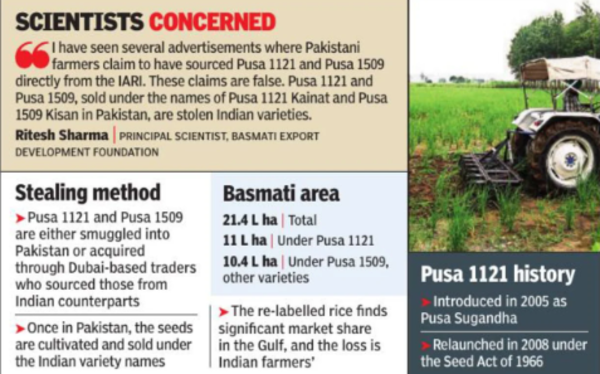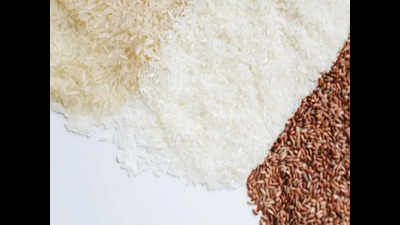AMRITSAR: Pakistani growers are pushing knock-off versions of India’s prized Pusa 1121 and Pusa 1509 basmati rice on social media, targeting international markets with imitation varieties marketed as 1121 Kainat and 1509 Kisan, threatening India’s global market share.
Social media is filled with promotions from Pakistani rice growers, using the names of well-known varieties developed at the Indian Agricultural Research Institute (IARI).This trend has alarmed the Indian rice growers and scientists. Pakistan has long produced and sold these imitation varieties, prompting the Indian govt to raise the issue with their counterparts from across the border.

Ritesh Sharma, principal scientist at the Basmati Export Development Foundation under the Agricultural and Processed Food Products Export Development Authority (APEDA), said: “It is wrong for Pakistani farmers to falsely advertise. I have seen several advertisements where Pakistani farmers claim to have sourced Pusa 1121 and Pusa 1509 directly from the IARI. The claims made on social media are false. Pusa 1121 and Pusa 1509, sold under the names of Pusa 1121 Kainat and Pusa 1509 Kisan in Pakistan, are stolen varieties.”
India introduced Pusa 1121 in 2005 as Pusa Sugandha before relaunching it in 2008 and notified it under the Seed Act of 1966. “Currently, about 21.4 lakh hectares are under basmati cultivation, with about 11 lakh hectares devoted to Pusa 1121, while the rest are used for Pusa 1509 and other varieties,” Ritesh said. Basmati grower Prabhpal Singh echoed scientiest Ritesh’s concerns, saying, “Pakistani farmers have stolen these varieties from India and are selling them under the same names to create confusion in the international market. This is highly condemnable.”
Another basmati farmer, Baljinder Singh, explained that the seeds of Indian varieties like Pusa 1121 and Pusa 1509 were either smuggled into Pakistan or acquired through Dubai-based traders who sourced those from Indian counterparts. Once in Pakistan, the seeds are cultivated and sold under the Indian variety names, capturing a significant market share in the Gulf region particularly, causing losses to the Indian farmers.
We also published the following articles recently
Farmers often forget the identity of cashew varieties after planting. The Cashew Farmers Tracking System (CFTS) by ICAR-Directorate of Cashew Research uses QR codes to provide detailed information on purchased varieties and track planting locations. This aids nurseries in monitoring crop spread and survival rates, enhancing the assessment of variety impact.
The Ministry of Commerce and Industry has removed the minimum export price for basmati rice, aiming to increase farmers’ income amid adequate domestic supply. The government also raised the basic duty on refined oil to 32.5% to boost demand for mustard, sunflower, and groundnut crops. Additionally, it abolished the minimum export price on onions.
The Centre has removed the minimum export price of $950 per metric tonne on Basmati rice, addressing concerns from Punjab’s rice millers and farmers over falling paddy prices. This decision is expected to boost global market access for Indian Basmati. The export ban on non-Basmati rice remains unchanged.
